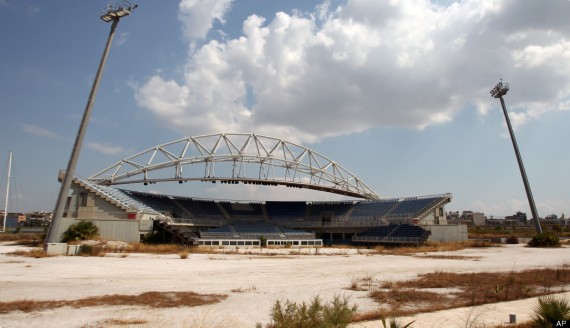Eight Years Later, Athens Olympic Venues Lie In Ruins
As the London Olympics enter their second week and Michael Phelps stands on the verge of winning his 22nd Olympic Medal, the venue where he won his first one in 2004 stands as a symbol to Greece’s broken economy and the boondoggle they invested in when they agreed to host the Olympics:
There’s still one group that loves the training pool for athletes at the former Olympic village in Athens’ northern fringe.
Frogs.
They appear to delight in sitting on debris that floats on the half-filled pool’s murky waters.
The athletes village itself has fared somewhat better, turned into housing for workers.
Eight years after the 2004 Athens Games, many of the Olympic venues Greece built at great expense remain abandoned or rarely used. They are the focus of great public anger as the country struggles through a fifth year of recession and nearly three years of a debt crisis that has seen a surge in poverty and unemployment.
At the southern Athens venue for softball — a sport unknown in Greece and already out of the Summer Olympics — the occasional weed is all that remains on the dried-out field.
With no shortage of real beaches in Greece, the purpose-built beach volleyball stadium has seen minimal use in the past eight years, mostly just concerts.
Other Athens venues have fared better. The badminton hall has been converted into a popular theater venue, the former international Olympic broadcast center is a shopping mall and what was the main press center now houses ministry offices.
(…)
Greek politicians, meanwhile, are still struggling to deal with those years of excess spending, and many economists still question the country’s future in the 17-nation common euro currency.
According to some estimates, the Greeks spent some € 10 billion to host the games, including construction costs and the like but not including an additional nearly € 1 billion for additional security in light of fears of terrorism in the wake of the September 11th attacks. Something tells me that they could’ve found a better use for that money.
Photo via Associated Press

I think it took decades for Montreal to pay off its Olympic debt http://www.cbc.ca/news/canada/montreal/story/2006/12/19/qc-olympicstadium.html
The only city that came close to breaking even was Los Angeles in 1984 because most of the necessary venues already existed.
Did you see the news that Mitt actually registered as a lobbyist, before he went to Washington for his $1.2B federal bailout for his Utah games?
Keep government out of our Olympics, I guess.
Some of the venues in China have gone to weeds, four years later. This is not unique to Greece.
I really think there are few places that can build venues that will remain in good use after the Olympics end.
I also think in general winter olympic venues stay in better use than summer ones.
Anymore it just seems like the Olympics cost a lot and unless a city already has a lot of useable venues it may not be worth the cost to build them if they won’t continue to be in use once the Olympics end.
I’ve been to the original Olympic stadium at the ruins of Olympia. It’s in better condition.
@Just Me: Tokyo has–I went though my training as a civil servant for the Japanese government at what used to be the Olympic dorms. Although Tokyo is probably the only city in the world that cannot afford to leave any space vacant/unusable, period.